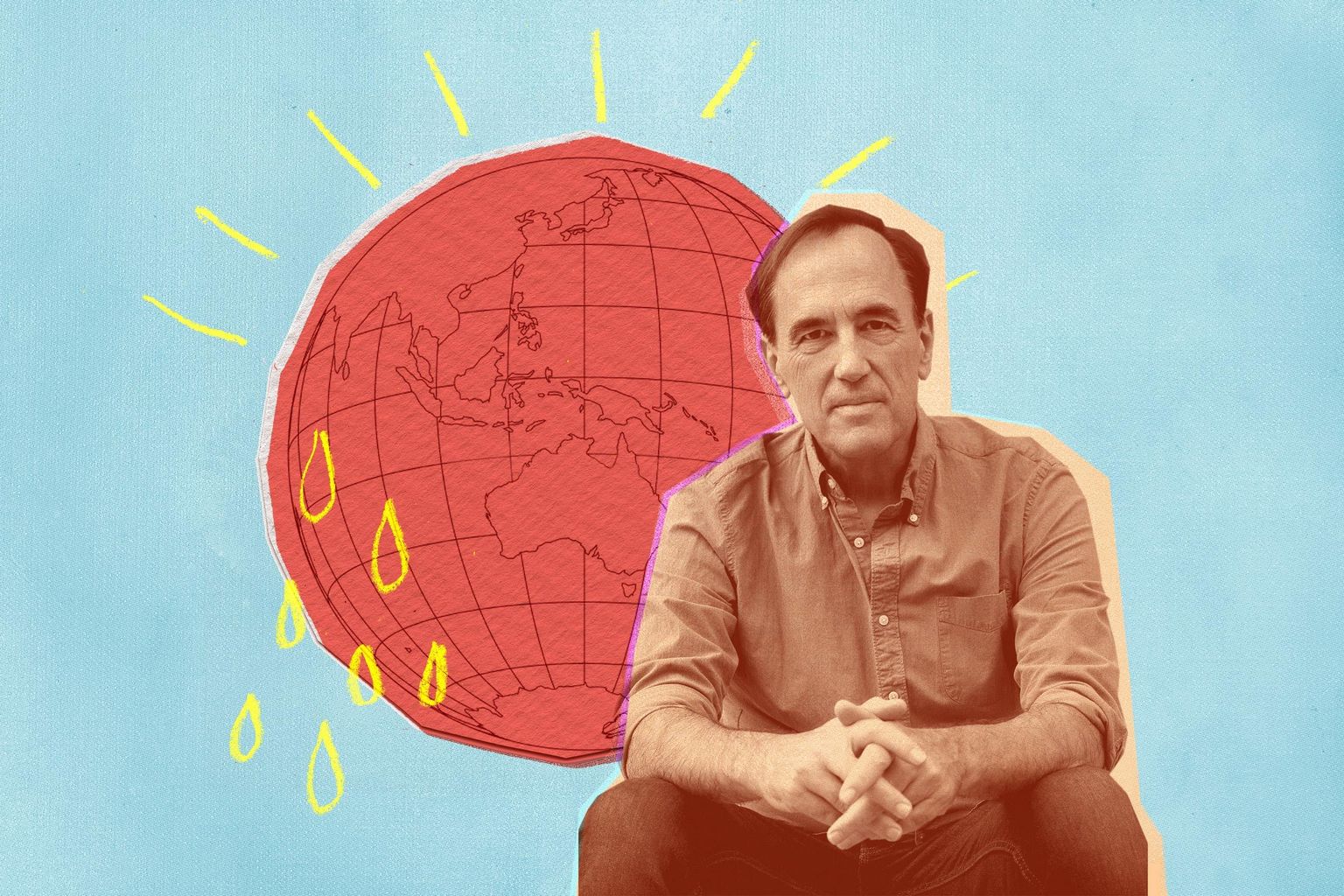Jeff Goodell wrote the best true crime book of 2023. Unfortunately, we’re the victims.
In The Heat Will Kill You First, the best-selling author turns an invisible, nebulous subject into a page-turning thriller.
- Published
- 31 Aug 2023
- Written by
- Thor Benson and Chris Harrigan
- Categories
- ProfilesClose Reads
- Reading time
- 7 min

Photo illustration: Emily Thiang/Matt Valentine
It’s the plot of a hundred disaster movies and the vision of every street-corner prophet. It’s also, of course, the daily news: fires rage, waters boil, people get concrete burns in the hot autumn sun. But where disaster films and doomsday preachers usually try to pull crowds, the baulk of our climate writing seems to actively turn people away. Instead of drawing us in with a drama befitting the end of the world, we’re presented with data, projections, maybe a quote from a climate scientist or government spokesperson. The result is a body of work that makes climate change feel distant and abstract—an impressive feat given how close and tangible it actually is. Such is the power of dry writing: it numbs what should otherwise cause us to cry out in pain.
Jeff Goodell understands this problem well—and he knows how to avoid it. The author of three bestselling books about climate change, Goodell can speak with rare authority on how writers should and shouldn’t approach the apocalypse if they want people to come along for the ride. The problem with most climate writing, he believes, is essentially one of intention. “Most people who write about climate don’t think about it as a story,” he says. “They think about it as information.”
And this, Goodell explains, is where everything usually goes awry.
It’s a few weeks after the publication of Goodell’s most recent book, The Heat Will Kill You First, and the 63-year-old author is feeling reflective. “Storytelling is how we understand our world,” he explains down the line from his home in Texas. It’s an oft-repeated line, especially by writers: we’re storytelling animals. But though it may be convenient for someone in the storytelling business to claim that storytelling is at the core of human nature, it is also, it turns out, a scientific fact. Evolutionary biologists claim that human beings are ‘hardwired’ to respond to narratives. So whenever Goodell returns from one of his research trips, he reaches not for hard facts, but for narrative.
The idea that a story could be more than idle entertainment came relatively late to Goodell. Raised in a conservative family that placed more value on rifles than reading, he became a professional motorcycle racer as a teenager—a job he loved until it almost killed him. (Goodell lost his spleen in an accident and nearly bled out on the operating table.) Adrift and looking for work in Silicon Valley in the ’80s, Goodell landed a job writing technical manuals for a small computer company called Apple. “It did not thrill me,” he would later write, so rather than take his manager up on a stock offer, he quit and moved to Lake Tahoe, where he dealt cards at night and skied during the day. After tiring of the lifestyle and lack of cerebral stimulation, he decided to study literature at Berkley, then headed to Columbia to write fiction.
Most people who write about climate don’t think about it as a story. They think about it as information.
The remaining lines of Goodell’s CV are a little less jagged. After finishing uni, he started writing for magazines in New York, where he applied what he’d learnt about story to the real-world issues of the day—crime, politics, AIDS—and honed his voice as a non-fiction writer. One day, an editor at The New York Times Magazine asked him to write about something he’d never given a second thought to: America’s coal industry, which was undergoing something of a renaissance under George W. Bush. It was an eye-opening experience—Goodell says he didn’t even know there was an American coal industry before he set off to write about it—and one that awoke in him an unexpected passion for environmental journalism. Since then, he has written little on much else.
It seemed to awaken something in the magazine’s readers, too; the article resonated so strongly that Goodell was asked to turn it into a book. The result, Big Coal: The Dirty Secret Behind America’s Energy Future, took four years to research and write. Goodell spent much of that time in the coal fields of West Virginia, Pennsylvania, and Wyoming, meeting those at the literal coal face of the developed world’s prosperity story. He followed that book with How to Cool the Planet—a journey into the frankly bonkers and morally complex world of geoengineering—before writing The Water Will Come, a horror story in which Goodell asked whether Atlantis wasn’t a myth but an early precursor to a new age of great flooding.
With each book, Goodell at times buckled under the weight of his subject matter. To avoid getting overwhelmed or losing his readers in a sprawling mess of detail, he stuck to an old mantra: keep it simple. The goal was to write a book, not a scientific paper. “I’m interested in narrative,” is how he put it when speaking with fellow journalist Max Linksy. “I'm interested in translating science into language that people can understand. And I'm interested in characters.”
When it came time to write The Heat Will Kill You First, retitled in Australia as Heat, Goodell says it helped to view the story like one of his early nuts-and-bolts magazine articles. “I’ve really come to see this now as a crime story,” he says. “This is a kind of looting of the atmosphere of the earth, siphoning off resources and grossly profiting off of that at the expense of billions of people on this planet.” It’s a useful frame, not least because a crime story gives the reader something firm to hang on to. You have good guys to root for, bad guys to loathe, and suspenseful moments of tension where hapless victims meet terrible ends or escape in the nick of time.
In lesser hands, this might feel cynical. But rather than cheapen his subject matter, Goodell uses these narrative devices to bring life to a subject that is both difficult to grasp and easy to turn away from. The climate, in all its chaotic interconnectedness, is too complicated for most scientists to wrap their heads around, let alone the average reader’s. So instead of writing about it in its entirety, Goodell uses individual elements of the bigger story—coal, rising sea levels, heat—as anchors to draw the reader in. We might not be able to fully perceive the countless micro and macro transformations taking place at every stratum across the planet. But we can understand the town about to be swallowed by the sea, or the city caught in the panic of a wet bulb heat wave.
In Heat, as in his previous books, Goodell grabs the reader on the very first page and holds on.
All of which would be for naught if the writing itself was a slog. But in Heat, as in his previous books, Goodell grabs the reader on the very first page and holds on. “When heat comes, it’s invisible,” he writes. “It doesn’t bend tree branches or blow hair across your face to let you know it’s arrived. The ground doesn’t shake. It just surrounds you and works on you in ways you can’t anticipate or control. You sweat. Your heart races. You’re thirsty. Your vision blurs. The Sun feels like the barrel of a gun pointed at you. Plants look like they’re crying. Birds vanish from the sky and take refuge in deep shade. Cars are untouchable. Colors fade. The air smells burned. You can imagine fire even before you see it.”
It’s a powerful opener, and one that carried even more weight as we spoke during the book’s release. It was June, and America was in the throes of one of its worst heat waves on record. The irony was not lost on Goodell. “The fact that these heatwaves struck literally at the same week my book came out was just eerie,” though he acknowledged the potential upside. It’s possible, he thought, that some of the media attention the book was receiving might be connected to the weather that had shut much of the country down. “And so we’re having this conversation. I think these extreme events offer opportunities for communication.”
Interestingly, however, Goodell doesn’t see himself as a proselytiser. “I don’t try to calculate what will or won’t inspire readers to activism,” he says. “I have no idea. I just try to write the most compelling story that I can.” He’s not a proponent of solutions journalism, either. “I don’t think it’s my job to get to the end of my book and say, ‘Okay, here’s the action plan we need to do’,” he tells Linksky. “Here’s the story that I see. Here’s the truth. I’m going to do my best to call it like it is. And you may disagree with my judgment, but you know where I stand, and I'm not hiding anything.”
So far, the approach seems to be working. In August, The Heat Will Kill You First joined Goodell’s previous climate books atop the New York Times Best Seller list, a clear sign that people will actually sit down and read bad news about the planet—even forking out $30 for the privilege—so long as it’s well written. And while he says he’s not looking to inspire readers to protest per se, he’s hopeful that more writers will follow his example. “For any journalist, I think this is just a totally fucking booming field. We’re not even finishing the prelude before the first chapter of the story,” he says. “There’s so much that hasn’t been explored and hasn’t been written about.”
Heat: Life and Death on a Scorched Planet is out in Australia through Black Inc.
